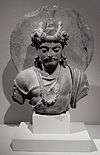Shōhaku Okumura
| Shōhaku Okumura | |
|---|---|
 | |
| Religion | Zen Buddhism |
| School | Sōtō |
| Education | Komazawa University |
| Personal | |
| Nationality | Japanese |
| Born |
June 22, 1948 Osaka, Japan |
| Spouse | Yūko Okumura |
| Children | Yōko and Masaki |
| Senior posting | |
| Based in | Sanshin Zen Community |
| Title | Priest |
| Predecessor | Kosho Uchiyama |
| Successor | Chikō Corona, Shōtai de la Rosa, Denshō Quintero, Shōju Mahler, Shōryu Bradley, Shōdō Spring, Hōkō Karnegis, and Eidō Reinhart |
| Part of a series on |
| Zen Buddhism |
|---|
 |
|
Persons Chán in China
Zen in Japan Seon in Korea Zen in the USA Category: Zen Buddhists |
|
Awakening |
|
Practice |
|
Related schools |
| Part of a series on |
| Western Buddhism |
|---|
 |
|
Main articles |
|
|
|
|
|
|
General Buddhism
|
Shōhaku Okumura (奥村 正博, b. 1948) is a Japanese Soto Zen priest and the founder and guiding teacher of the Sanshin Zen Community (Sanshinji) located in Bloomington, Indiana,[1] where he and his family currently live. From 1997 until 2010, Okumura also served as Director of the Soto Zen Buddhism International Center in San Francisco, California, which is an administrative office of the Soto school of Japan (formerly located in Los Angeles California under the name North American Soto School in Los Angeles).
Biography
Shōhaku Okumura was born in Osaka, Japan in 1948. He received his education at Komazawa University in Tokyo, Japan, where he studied Zen Buddhism. On December 8, 1970, Okumura was ordained at Antaiji by his teacher Kosho Uchiyama, where he practiced until Uchiyama retired in 1975.[2] He then traveled to the United States, where he co-founded Valley Zendo in Massachusetts[3] and continued Uchiyama's style of zazen practice there until 1981.[3] In that year, he returned to Japan and began translating the writings of Uchiyama and Eihei Dogen from Japanese into English. Prior to founding the Sanshin Zen Community, in 1996, he was a teacher at the Minnesota Zen Meditation Center in Minneapolis, Minnesota from 1993-1996[4] and at the Kyoto Soto Zen Center, in Japan.
Teaching
Okumura has dedicated his life to zazen and to the study and translation of Dogen's writings. Among contemporary Zen teachers, he offers the unique perspective of a practitioner who is active in both the Japanese and Western Soto Zen communities, as well as insights that come from his translation work. The two main focuses of Okumura's teaching career have been sharing the zazen practice of his teacher Kosho Uchiyama and giving extensive commentaries on the works attributed to Dogen. In addition to sesshins, he leads four intensive study retreats (called genzo-e) each year, which are dedicated to particular fascicles of Dogen's Shōbōgenzō. These take place at Okumura's home temple, Sanshinji, at other American Zen centers, and occasionally outside the United States. Okumura's wife, Yuko, serves as the sewing teacher at Sanshin Zen Community, continuing the nyoho-e style of okesa and rakusu sewing that was encouraged by Uchiyama's teacher, Kodo Sawaki. The author James Ishmael Ford describes Shohaku Okumura as both "Possibly the leading figure in the direct line of this lineage in North America..."[5] and "...a tireless worker bridging the gap between Japanese and non-Japanese practice communities."[6]
Bibliography
- Okumura, Shohaku (2012). Living by Vow: A Practical Introduction to Eight Essential Zen Chants and Texts. Somerville, MA: Wisdom Publications. ISBN 1-61429-010-5.
- Bokusan, Nishiari; Shohaku Okumura; Shunryu Suzuki; Kosho Uchiyama; Sojun Mel Weitsman; Kazuaki Tanahashi; Dairyu Michael Wenger (2011). Dogen's Genjokoan: Three Commentaries. Berkeley,CA: Counterpoint. ISBN 1582437432.
- Okumura, Shohaku (2010). Realizing Genjokoan: The Key to Dogen's Shobogenzo. Somerville, MA: Wisdom Publications. ISBN 0-86171-601-9.
- Leighton, Taigen Dan; Shohaku Okumura (2004). Dogen's Extensive Record: A Translation of the Eihei Koroku. Somerville, MA: Wisdom Publications. ISBN 0-86171-305-2.
- Uchiyama, Kosho; Thomas Wright; Jishō Cary Warner; Shohaku Okumura (2004). Opening the Hand of Thought: Foundations of Zen Buddhist Practice. Boston: Wisdom Publications. ISBN 0-86171-357-5.
- Okumura, Shohaku, editor (2003). Dogen Zen and its Relevance for Our Time: An International Symposium Held in Celebration of the 800th Anniversary of the Birth of Dogen Zenji, Stanford University , October 23–24, 1999. San Francisco, CA: Sōtō Zen Buddhism International Center.
- Warner, Jisho Cary; Shohaku Okumura; Taigen Dan Leighton; John McRae (2001). Nothing is Hidden : Essays on Zen Master Dogen's Instructions for the Cook. New York: Weatherhill. ISBN 0-8348-0478-6.
- Okumura, Shohaku; Taigen Dan Leighton (1997). The Wholehearted Way: A Translation of Eihei Dogen's Bendowa. Boston: Tuttle Publishing. ISBN 0-8048-3105-X.
- Leighton, Taigen Dan; Shohaku Okumura (1996). Pure Standards for the Zen Community: A Translation of the Eihei Shingi. Albany, NY: SUNY Press. ISBN 0-585-04623-9.
- Okumura, Shohaku (1990). Shobogenzo Zuimonki: Sayings of Eihei Dogen Zenji. Kyoto, Japan: Kyoto Sōtō-Zen Center. OCLC 215148008.
- Uchiyama, Kosho; trans. Koshi Ichida; Marshall Mittnick; George Vavares; Shohaku Okumura (1990). The Zen Teaching of Homeless Kodo. Kyoto, Japan: Kyoto Sōtō-Zen Center.
- Okumura, Shohaku (1988). Dogen Zen. Kyoto, Japan: Kyoto Sōtō-Zen Center. OCLC 29269397.
- Okumura, Shohaku (1985). Shikantaza: An Introduction to Zazen. Kyoto, Japan: Kyoto Sōtō-Zen Center. OCLC 18308720.
See also
References
- ↑ Okumura, Shohaku (Fall 2005). "Kokoro". Buddhadharma: the Practitioner's Quarterly. Retrieved 2008-03-15.
- ↑ Uchiyama, Kosho; Thomas Wright; Jishō Cary Warner; Shohaku Okumura (2004). Opening the Hand of Thought: Foundations of Zen Buddhist Practice. Wisdom Publications. pp. xvii–xxi. ISBN 0-86171-357-5.
- 1 2 Okumura, Shohaku (2012). Living By Vow. Wisdom Publications. pp. 182–183. ISBN 9781614290100.
- ↑ Okumura, Shohaku (2012). Living By Vow. Wisdom Publications. pp. ix. ISBN 9781614290100.
- ↑ Ford, James Ishmael (2006). Zen Master Who?: A Guide to the People and Stories of Zen. Wisdom Publications. p. 140. ISBN 0-86171-509-8.
- ↑ Ford, James Ishmael (2006). Zen Master Who?: A Guide to the People and Stories of Zen. Wisdom Publications. p. 139. ISBN 0-86171-509-8.